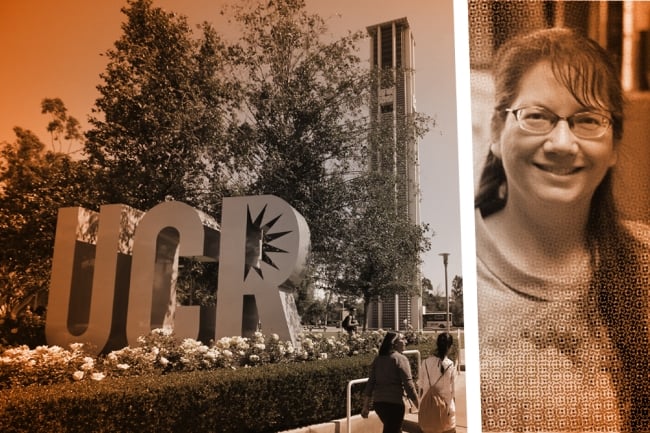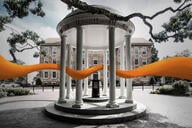You have /5 articles left.
Sign up for a free account or log in.

Andrea Smith, an ethnic studies professor, is leaving UC Riverside next August.
Photo illustration by Justin Morrison/Inside Higher Ed | Stan Lim, University of California, Riverside
Andrea Smith has been publicly criticized for her contested claims of Cherokee heritage for at least 15 years. Despite this, she remained employed as a prominent Native American Studies scholar.
But the condemnations have led to a turning point. According to a “separation agreement and release of all claims” shared on social media Thursday, she is resigning from the University of California, Riverside, next August after 13 faculty members at Riverside alleged a year ago that she “made fraudulent claims to Native American identity in violation of the Faculty Code of Conduct provisions concerning academic integrity.”
The deal, signed by Smith in December and UC Riverside’s chancellor in January, says Smith will be eligible for retirement and an emeritus title, consistent with a policy that says every retiring professor or associate professor receives it. However, the document states, “Professor Smith agrees that her status as a professor emeritus will not be listed on the university directory information websites.”
The agreement says that the university, upon receiving the complaint, “engaged Professor Smith in discussions on informal resolution” but did not launch a “formal university investigation” or make findings on the allegations.
It says the deal’s purpose is to “avoid the substantial expense and inconvenience of further administrative or legal proceedings, to provide certainty to the parties for future planning purposes and to settle fully and finally all differences that may exist.” The university agreed to pay Smith’s attorney fees, up to $5,000.
“Professor Smith agrees to not make any affirmative claims of Native American heritage in connection with her university work for the duration of her university employment,” the document says. “However, if asked about her heritage in connection with her university work, Professor Smith is permitted to disclose her opinion on her Native American heritage.”
Jacqueline Keeler—a journalist, author, Navajo Nation citizen and descendant of the Yankton Sioux Tribe—shared the agreement on Instagram and X, formerly known as Twitter, on Thursday. The university provided a copy to Inside Higher Ed early Friday evening.
“It is the ultimate form of colonization, where they actually become us instead of actually listening to us,” Keeler told Inside Higher Ed.
Gerald Clarke, a UC Riverside ethnic studies professor and member of the Cahuilla Band of Indians, said Friday that he was one of the complainants.
“We’ve lost so much over the last 500 years, you know, and our identity is maybe the most precious thing that we’ve had to help fuel our resistance and our ability to survive in this very day,” Clarke said. “And for other people to come and commandeer that, you know, it’s very disheartening.”
“As a member of my community, I have an obligation and responsibility to say something,” said Clarke, who stressed that he was speaking as an individual and not as a UC Riverside professor. “I have no choice in the matter—I owe that to my elders and my children to speak up,” he said.
A UC Riverside spokesman wrote in an email that the “separation agreement will bring a negotiated end to Professor Smith’s employment with the university.”
Smith didn’t respond to requests for comment Friday. In the document, the university agreed to “refrain from making any public announcement concerning Professor Smith’s retirement.”
There have been controversies at multiple universities around white professors claiming to be of some other racial or ethnic background. Keeler calls those who assume Native American identities for professional advancement “pretendians.”
“Academia is basically a pretendian factory,” Keeler said.
This spring, Elizabeth M. Hoover, an associate professor of environmental science, policy and management at UC Berkeley, admitted she’s white after a lifetime of claiming she was Native American. Hoover said she was shocked when research revealed her family’s stories were apparently not true.
Perhaps the most infamous white academic to claim another identity was Rachel Dolezal, the now-former leader of the Spokane, Wash., NAACP and now-former adjunct instructor of Africana Studies at Eastern Washington University. She was exposed by her own parents for being white, not Black.
In 2015, The Daily Beast published an article on Smith headlined, “Meet the Native American Rachel Dolezal.”
Shortly after that story was published, Smith wrote on her blog that “I have always been, and will always be Cherokee. I have consistently identified myself based on what I knew to be true. My enrollment status [on the official list of Cherokee Nation members] does not impact my Cherokee identity or my continued commitment to organizing for justice for Native communities.”
“It is my hope that more Indigenous peoples will answer the call to work for social justice without fear of being subjected to violent identity-policing,” she wrote. “I also hope the field of Native studies might attend to disagreement and difference in a manner that respects the dignity of all persons rather than through abusive social media campaigns.”
Smith helped organize the group INCITE, which described itself as “a network of radical feminists of color.” For many of her campus appearances, she was introduced in ways that explicitly called her Cherokee. There are also videos of her being introduced at conferences as a Cherokee.
Keeler criticized universities for their handling of “pretendians.”
“They don’t investigate it, they don’t do any scholarship or any really data-driven analysis,” she said. “They have basically hollowed out Native American Studies to make space for fraud.”




